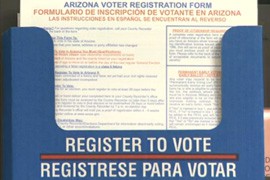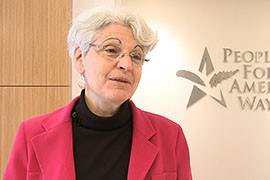Cronkite News has moved to a new home at cronkitenews.azpbs.org. Use this site to search archives from 2011 to May 2015. You can search the new site for current stories.
Advocates vow appeal of latest ruling in fight over Arizona voter law
WASHINGTON – A federal judge’s order backing Arizona and Kansas laws that require proof of citizenship for voter registration is “not the American way” and must be challenged, opponents said Thursday.
The comments came after a U.S. District judge in Kansas ordered the Election Assistance Commission to include the two states’ proof-of-citizenship requirement on federal voter registration forms, which only require that people check a box verifying their U.S. citizenship.
“We will appeal it,” said Sam Wercinski, executive director of the Arizona Advocacy Network. He said no official decision has been made, but he expects voting-rights advocates will file an appeal “within 30 to 60 days.”
But state officials in Kansas and Arizona said they are confident the latest decision will stand – and that they do not intend to wait for appeals.
“They have a right to appeal, but the decision was made effective immediately,” Arizona Attorney General Tom Horne said Thursday.
It is the latest twist in a case that went to the U.S. Supreme Court, which ruled last summer that Arizona officials could not reject federal voter registration forms because they did not require proof of citizenship.
But the high court did not reject the state law, Proposition 200, that called for citizenship proof on the state’s registration form. And the court said states could ask the federal government to include Arizona’s – and now Kansas’ – proof-of-citizenship requirement on the federal form.
When the EAC in January refused the states’ request, Arizona and Kansas sued.
U.S. District Judge Eric Melgren sided with the states Wednesday, saying federal law did not pre-empt the tougher state standards and that the EAC unlawfully refused to include the state requirements on its forms. He ordered the commission to “add the language requested by Arizona and Kansas” immediately.
Wercinski called that decision a “direct contradiction” to the Supreme Court ruling. Other advocates said it would disenfranchise minority groups by making them jump through more hoops to vote.
“In most democracies, it’s a responsibility of citizenship to vote,” said Marge Baker, executive vice president of People for the American Way. “It seems like we keep putting people through hoop after hoop after hoop.”
While the laws are aimed at reducing voter fraud, Baker said it is “an effort to deal with a problem that just doesn’t exist” – far less than 1 percent of Arizona voters have been found to be noncitizens, she said.
Sen. Steve Gallardo, D-Phoenix, agreed, saying Horne is “the only one who believes that there is massive voter fraud.”
Horne insists it is “a serious issue,” pointing to previous estimates that at least 2,000 voters in the state were registered fraudulently.
Opponents said the proposed solution causes a bigger problem than voter fraud – it keeps U.S. citizens from being able to vote.
The laws would require tangible proof of citizenship such as a birth certificate or state-issued ID to register, forms that Baker said are difficult for some people to produce.
“This decision could have a chilling effect on voting,” she said. “But what’s more important is that there are citizens out there who simply don’t have … easy access to the documentation.”
She said people in rural areas, the elderly and those who have fled from domestic violence or natural disasters can all have trouble providing documentation.
Gallardo said the decision even “hurts a lot of college students” who have difficulty providing required documentation to register.
“If we want photo identification, we need to expand the types of documents,” such as allowing a college ID, he said.
Kansas Secretary of State Kris Kobach called that “a strange claim, because usually students are most likely to have a birth certificate.”
Kobach, who filed the latest suit with Arizona Secretary of State Ken Bennett, said tougher requirements are the right thing to do.
“It’s absolutely the American way. Only Americans should vote in our American elections,” he said.
But Gallardo predicts an appeal that will “go all the way up to the U.S. Supreme Court.”









